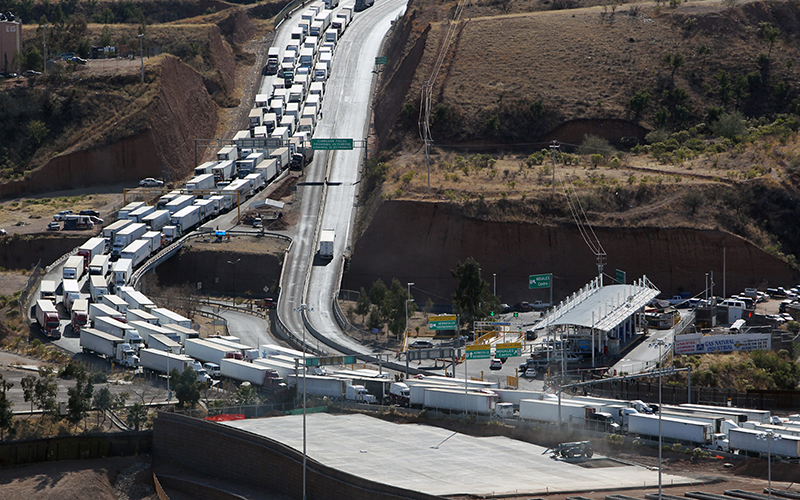WASHINGTON – Gov. Doug Ducey gave conditional support Wednesday to a “short as possible” border shutdown, then shifted the blame to Congress which he said has been playing politics with the border issue.
Ducey’s comments came after a brief meeting at the White House with President Donald Trump, who threatened last week to close the border in the face of a migrant surge that has overwhelmed border agencies.
That threat was immediately attacked by business leaders, who noted that it would affect more than $1 billion in goods that cross the border every day with Mexico, the third-largest trading partner of the U.S., not to mention the impact on visitors and tourists.
Trump appears to have cooled to the idea, and Ducey was clearly not a fan of it Wednesday. But both men said border security should take priority over economics, even though Ducey said said no one wants to see a shutdown right now.
“I think it’s a hypothetical right now,” Ducey said when asked by reporters about a possible shutdown. “But if that were the situation, we would be supportive of it and want it to be as short as possible.
“I don’t see the reason that that should have to happen when all Congress needs to do is act on something I think everyone, Democrat and Republican, knows is a real issue,” he said of border security.
Ducey called for a physical barrier at the border, more “boots on the ground” and increased technology and surveillance.
Rep. Tom O’Halleran, D-Sedona, agreed that Congress has a responsibility to act but said it is already doing so, even though it has not funded the border wall that Trump has demanded.
“Congress has a responsibility to address border security and pass comprehensive immigration reform,” O’Halleran said in a statement. “We must provide funding to fill the thousands of open Border Patrol positions, and I have called for greater investment in 21st century security technology that has been proven effective.”
Garrick Taylor, a spokesman for the Arizona Chamber of Commerce, said that the “business community understands the difficult task the Department of Homeland Security is faced with,” but still balks at the threat of a border shutdown.
“We continue to believe … that a border closure would be an economic calamity, and we certainly hope it doesn’t come to pass,” he said Wednesday.
Trump’s threat last week was not directed at Congress but at forcing Mexico and the Northern Triangle countries of Central America – El Salvador, Honduras and Guatemala – to stop the flow of immigrants before they reach the U.S. border.
In addition to his threat to close the border if Mexico did not stop immigrants at its southern border, Trump said he would halt $450 million in aid to the three Central American countries.
Neither of those have happened, but the State Department this week said it was looking into cutting off the aid, while CBP said it is redeploying 750 officers from ports of entry to border patrol roles.
It came as Customs and Border Protection said last week that its facilities and officers were being overwhelmed by a surge in migrants, many of them women and children from the Northern Triangle. CBP said it was holding 12,000 immigrants in custody last week, twice what it calls the “crisis level,” and was on track to apprehend 100,000 in March, the most for that month in a decade.
Unable to cope, the agency has been releasing immigrants into the community after they are processed for court hearings, overwhelming charities and sparking an outcry from immigration advocates and opponents alike.
Rep. Raul Grijalva, D-Tucson, said in a statement earlier this week that “the spike in families fleeing violence and seeking asylum is a humanitarian crisis.” He said the administration “is creating a significant backlog” by refusing to consider alternatives to detention and by understaffing CBP.
“Using families as political pawns, threatening to close the southern border, and declaring a fake emergency are no way to conduct policy,” his statement said.
But Ducey said the crisis is real and he worries that it does not appear to be slowing down.
“Nonprofits are overwhelmed and reaching the breaking point,” Ducey told reporters outside the White House. “With summer coming very soon in Arizona, the temperature is rising, I’m concerned that any migrant that crosses the border can be in real danger.”
Ducey said Arizona has been able to effectively secure the border and have strong trade with Mexico, which he rose 7.7% between 2017 and 2018, when trade between Arizona and Mexico reached $16.7 billion. He said he hopes Congress will find a way to do both as well.
“There’s no reason you can’t do both, Arizona’s done it,” he said. “And now the United States Congress can do it.”
AlertMe
